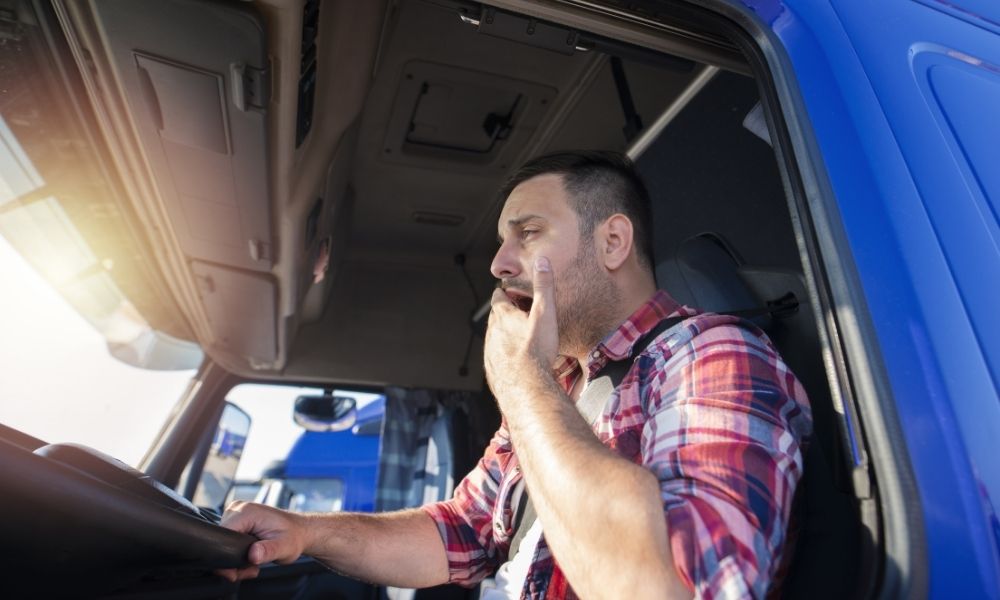
Although driverless and self-driving vehicle technology is becoming more advanced, the large majority of vehicles on the road are operated by a human driver. Even vehicles with driverless capabilities still require the driver to be alert while operating the vehicle. People on the road for long hours, like 18-wheeler truck drivers, are more likely to fall asleep while driving because they’re drowsy from lack of sleep. 18-wheeler drivers who doze off for even a second can drift into another lane, oncoming traffic, or off-road, causing rollover accidents. Drivers who fall asleep at the wheel of 18 wheelers and large trucks can cause severe injuries and damages if they crash at high rates of speed. Knowing how to tell if you are at risk of being injured by a drowsy 18 wheeler driver can help prevent catastrophic crashes and injuries.
Who Does It?
By a large margin, the biggest culprits of drowsy driving are commercial drivers, which include the drivers of semi-trucks, busses, and tow trucks, and 18 wheelers. These people spend their entire work schedule on the road, causing them to be a large percentage of drowsy drivers on the road. If you or someone you know has been a victim of an 18-wheeler accident due to drowsy driving, be sure to contact an experienced Corpus Christi personal injury lawyer at our firm to find out if you are entitled to financial compensation.
In addition to large truck drivers, others who are likely to drive while drowsy are people with sleep disorders, people on medications, and people who work long hours or night shifts. However, all of these are much less common than commercial drivers.
How Does It Happen?
Signs of drowsiness:
- Feeling sleepy
- Yawning more than usual
- Taking long blinks or blinking more frequently
- Drifting out of your lane
- Not remembering the last few miles
- Missing an important turn
How To Prevent It
By far, the most effective way to prevent drowsy driving is by getting enough sleep. 18-wheeler and commercial vehicle drivers are normally on strict time schedules with little time for rest. Some companies even go through the process of falsifying their driving log books to make it appear that they are getting enough sleep.
If you are already on the road and having a hard time staying awake, your best option is to sleep it off or have someone else take over for you. However, you are not in control of others on the road and the risk of drowsy drivers can be all around.
To prevent being injured in an 18 wheeler crash caused by a drowsy driver, pay attention to a few things on the road.
- Swerving Lanes – If a large truck or 18 wheeler is swerving in and out of their lane, there is a high risk that the driver is drowsy and trying their best to stay alert. If you see an 18 wheeler swerving lanes, do not drive in the lanes next to it and do your best to pass the large truck.
- Extremely Fast or Slow Speeds – If an 18 wheeler is traveling at an unusually high or low rate of speed, it may be safe to assume they are drowsy and not managing foot pressure on the gas pedal. If you are near an 18 wheeler that cannot manage their speed, safely pass or move around them on the road.
- Headlights Off – If an 18 wheeler driver is operating the large truck after sundown without headlights, there is a high possibility that the driver is extremely drowsy or under the influence of drugs or alcohol. If you see a large 18 wheeler without headlights, do your best to get around the truck and contact authorities. Having an officer stop the 18 wheeler can help prevent a fatal accident on the road.
Unfortunately, not all drivers are able to avoid a collision with an 18 wheeler driver and end up becoming victims of their negligence. If you or a loved one has been injured by a drowsy 18 wheeler driver, contact an 18 wheeler truck accident lawyer at The Patel Law Firm PLLC. We understand the hardships that come with severe injuries and can help aid in the recovery process. Contact us today for a free and confidential case evaluation to discuss the injuries and damages caused by a drowsy 18 wheeler driver. Give us a call today (956) 527-0321.